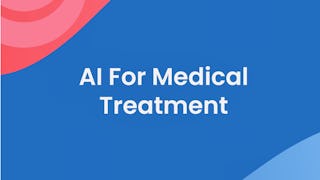AI is transforming healthcare, offering new ways to improve diagnostics, personalize treatment, and streamline clinical workflows. In this course, you will explore why AI is essential in modern healthcare, examining how data—ranging from electronic health records to medical imaging—drives AI-powered solutions. You’ll be introduced to key data exploration techniques used to uncover patterns and insights in healthcare data, as well as foundational AI approaches, including traditional rule-based systems, predictive analytics, and emerging generative AI models. We’ll also discuss the challenges of AI in healthcare, including biases, ethical concerns, and AI ‘hallucinations’—instances where AI generates misleading or incorrect information. By the end of this course, you’ll have a solid understanding of AI’s capabilities and limitations in healthcare and be prepared to critically assess its role in patient care and decision-making.



Kompetenzen, die Sie erwerben
- Kategorie: Health Care
- Kategorie: Data Collection
- Kategorie: Artificial Intelligence
- Kategorie: Healthcare Industry Knowledge
- Kategorie: Clinical Data Management
- Kategorie: Supervised Learning
- Kategorie: AI Personalization
- Kategorie: Machine Learning
- Kategorie: Artificial Intelligence and Machine Learning (AI/ML)
- Kategorie: Classification And Regression Tree (CART)
- Kategorie: Health Informatics
- Kategorie: Large Language Modeling
- Kategorie: Health Systems
- Kategorie: Generative AI
- Kategorie: Unsupervised Learning
- Kategorie: Predictive Analytics
- Kategorie: Applied Machine Learning
Wichtige Details

Zu Ihrem LinkedIn-Profil hinzufügen
März 2025
11 Aufgaben
Erfahren Sie, wie Mitarbeiter führender Unternehmen gefragte Kompetenzen erwerben.

In diesem Kurs gibt es 4 Module
Artificial Intelligence (AI) was created as a discipline in the late 1950s. Its initial goal was to understand and reproduce human intelligence on computers. This ambitious aspiration flourished as a research discipline for some time, with progress and excitement waxing and waning over the past six or seven decades. The field has survived two “AI winters” in the mid 1970s and again in the early 1990s. An AI winter is a period of time when disappointment and lack of progress results in loss of interest from research funders, companies, and the general public. This usually follows a period of intense optimism and concentrated hype around the possibilities. However, AI has managed to come back stronger since the previous two AI winters, and today, excitement about AI and growth of its market size is higher than ever before. It is now difficult to imagine a single discipline–healthcare, the life sciences, business, finance, the environment, navigation and transportation, and many others–that has not begun to transform because of what AI is capable of achieving. In this module, we will cover how the field of AI got to where it is today and describe general concepts in the field. We hope you enjoy the course. Let’s dive in.
Das ist alles enthalten
2 Videos10 Lektüren2 Aufgaben1 App-Element1 Diskussionsthema
In this module, we discuss what is perhaps the most important factor that determines the success of AI algorithms: data. In particular, we will address some of the main challenges to overcome when considering the collection of, and working with, healthcare data. This module will also introduce AI techniques that comprise the supervised machine learning (ML) family. This section will walk you through the conceptual framework and fundamental math underlying these techniques. Finally, we will explore common approaches used to evaluate how well these types of models perform. At the end of this module, you should have a foundational understanding of the challenges facing healthcare data curation, mathematical approaches to formulating healthcare data science problems that involve diagnosis and prediction, and the most important fundamental approaches to ML in these problems, such as classification trees, and ensemble classifier methods.
Das ist alles enthalten
11 Lektüren4 Aufgaben1 Diskussionsthema
What is artificial intelligence? Even before scientists invented the term, scholars such as Alan Turing and John von Neumann were wrestling with many of the mathematical and logical challenges that AI researchers still face today. Ever since the term was coined at a conference in the summer of 1957, scientists, philosophers, and policymakers have hotly debated how to define AI. However, because this is not a mathematics, computer science, or philosophy course, our goal in this module is to provide you with practical definitions of key terms associated with AI and provide a qualitative overview of common AI models. We do hope some of you will be inspired to take additional courses that will more rigorously explore topics covered in this module.
Das ist alles enthalten
1 Video10 Lektüren3 Aufgaben1 peer review
In this module, we will introduce the concept of generative machine learning (ML) models and explain how these models are different from the discriminative models we learned about in prior modules. If you don’t know what “discriminative models” means, keep reading and we’ll define the term before going much deeper. From this foundation, we will introduce the concept of generative AI and explore how it fits into the broader field of ML. After learning some basics about generative AI, we will dive into large language models (LLMs), learn how hallucinations are better considered errors.
Das ist alles enthalten
1 Video9 Lektüren2 Aufgaben
Erwerben Sie ein Karrierezertifikat.
Fügen Sie dieses Zeugnis Ihrem LinkedIn-Profil, Lebenslauf oder CV hinzu. Teilen Sie sie in Social Media und in Ihrer Leistungsbeurteilung.
Dozent

Mehr von Machine Learning entdecken
 Status: Kostenloser Testzeitraum
Status: Kostenloser TestzeitraumStanford University
 Status: Vorschau
Status: VorschauCoursera Instructor Network
 Status: Kostenloser Testzeitraum
Status: Kostenloser TestzeitraumDeepLearning.AI
 Status: Vorschau
Status: VorschauCoursera Instructor Network
Warum entscheiden sich Menschen für Coursera für ihre Karriere?





Neue Karrieremöglichkeiten mit Coursera Plus
Unbegrenzter Zugang zu 10,000+ Weltklasse-Kursen, praktischen Projekten und berufsqualifizierenden Zertifikatsprogrammen - alles in Ihrem Abonnement enthalten
Bringen Sie Ihre Karriere mit einem Online-Abschluss voran.
Erwerben Sie einen Abschluss von erstklassigen Universitäten – 100 % online
Schließen Sie sich mehr als 3.400 Unternehmen in aller Welt an, die sich für Coursera for Business entschieden haben.
Schulen Sie Ihre Mitarbeiter*innen, um sich in der digitalen Wirtschaft zu behaupten.
Häufig gestellte Fragen
Access to lectures and assignments depends on your type of enrollment. If you take a course in audit mode, you will be able to see most course materials for free. To access graded assignments and to earn a Certificate, you will need to purchase the Certificate experience, during or after your audit. If you don't see the audit option:
The course may not offer an audit option. You can try a Free Trial instead, or apply for Financial Aid.
The course may offer 'Full Course, No Certificate' instead. This option lets you see all course materials, submit required assessments, and get a final grade. This also means that you will not be able to purchase a Certificate experience.
When you purchase a Certificate you get access to all course materials, including graded assignments. Upon completing the course, your electronic Certificate will be added to your Accomplishments page - from there, you can print your Certificate or add it to your LinkedIn profile. If you only want to read and view the course content, you can audit the course for free.
You will be eligible for a full refund until two weeks after your payment date, or (for courses that have just launched) until two weeks after the first session of the course begins, whichever is later. You cannot receive a refund once you’ve earned a Course Certificate, even if you complete the course within the two-week refund period. See our full refund policy.
Weitere Fragen
Finanzielle Unterstützung verfügbar,
 enthalten
enthalten
